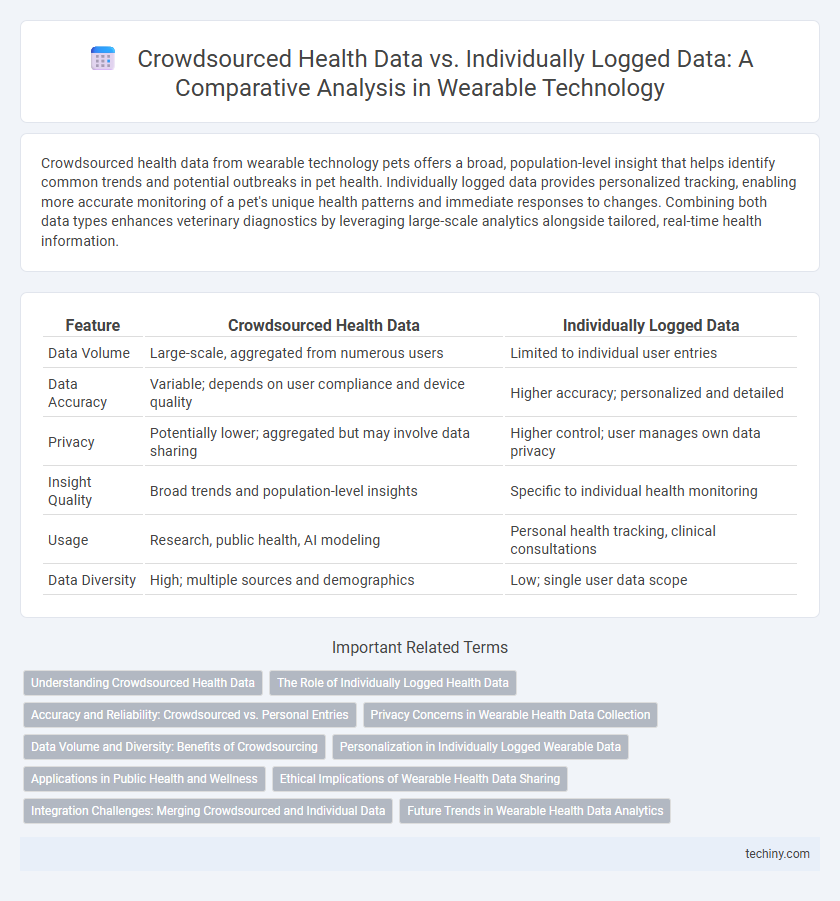Crowdsourced health data from wearable technology pets offers a broad, population-level insight that helps identify common trends and potential outbreaks in pet health. Individually logged data provides personalized tracking, enabling more accurate monitoring of a pet's unique health patterns and immediate responses to changes. Combining both data types enhances veterinary diagnostics by leveraging large-scale analytics alongside tailored, real-time health information.
Table of Comparison
| Feature | Crowdsourced Health Data | Individually Logged Data |
|---|---|---|
| Data Volume | Large-scale, aggregated from numerous users | Limited to individual user entries |
| Data Accuracy | Variable; depends on user compliance and device quality | Higher accuracy; personalized and detailed |
| Privacy | Potentially lower; aggregated but may involve data sharing | Higher control; user manages own data privacy |
| Insight Quality | Broad trends and population-level insights | Specific to individual health monitoring |
| Usage | Research, public health, AI modeling | Personal health tracking, clinical consultations |
| Data Diversity | High; multiple sources and demographics | Low; single user data scope |
Understanding Crowdsourced Health Data
Crowdsourced health data aggregates biometric and behavioral information from large populations via wearable devices, enabling trend analysis and predictive health insights at scale. This data enhances epidemiological studies by providing real-time, diverse datasets across demographics, improving disease tracking and health outcome modeling. Unlike individually logged data, crowdsourced datasets leverage collective participation to identify patterns and anomalies that may be undetectable in isolated records.
The Role of Individually Logged Health Data
Individually logged health data plays a crucial role in wearable technology by providing personalized insights tailored to a user's unique physiology and lifestyle patterns. This data allows for precise monitoring of vital signs, activity levels, and sleep quality, enabling users and healthcare providers to track progress and adjust interventions effectively. Unlike crowdsourced health data, individually logged data ensures accuracy and contextual relevance, enhancing the potential for customized health recommendations and early detection of anomalies.
Accuracy and Reliability: Crowdsourced vs. Personal Entries
Crowdsourced health data offers vast datasets that enhance the accuracy of population-level insights through aggregated patterns, while individually logged data provides higher reliability and precision tailored to personal health conditions. Wearable devices capture real-time biometric metrics such as heart rate variability and activity levels, but personal entries can introduce subjective biases and inconsistencies. Integrating both data types optimizes the overall validity of health monitoring by balancing broad trends with individualized accuracy.
Privacy Concerns in Wearable Health Data Collection
Wearable technology collects vast amounts of health data, raising significant privacy concerns, particularly with crowdsourced health data. Crowdsourced data, aggregated from multiple users, increases risks of de-identification and unauthorized access due to large-scale data sharing and storage. Individually logged data, while seemingly more secure, faces vulnerabilities from device hacking and third-party app integrations, highlighting the need for robust encryption and strict data governance policies in wearable health data collection.
Data Volume and Diversity: Benefits of Crowdsourcing
Crowdsourced health data offers significantly larger data volumes compared to individually logged data, enabling more comprehensive analysis and robust machine learning models. The diversity of participants in crowdsourced data sets enhances population-level insights by capturing a wide range of demographics, behaviors, and environmental factors. This variability improves the generalizability and accuracy of health predictions and personalized recommendations in wearable technology applications.
Personalization in Individually Logged Wearable Data
Individually logged wearable data enables precise personalization by capturing unique physiological patterns and lifestyle habits, which crowdsourced health data cannot replicate due to its aggregated nature. Personalized algorithms leverage this singular data to tailor health insights, interventions, and fitness plans with greater accuracy, improving user engagement and outcomes. Wearable devices that prioritize individual data logging enhance predictive health models by continuously adapting to real-time changes in a user's biometrics and behaviors.
Applications in Public Health and Wellness
Crowdsourced health data from wearable technology offers scalable insights into population-level trends, enabling early detection of outbreaks and targeted wellness interventions. Individually logged data provides personalized health monitoring, enhancing preventive care and chronic disease management through tailored feedback. Combining both data types improves public health strategies by integrating broad epidemiological patterns with individualized health behavior analysis.
Ethical Implications of Wearable Health Data Sharing
Crowdsourced health data from wearable technology offers extensive population-level insights but raises significant ethical concerns regarding privacy, consent, and data ownership. Individually logged data provides personalized health information with clearer user control but risks misuse and unauthorized sharing if not properly secured. Ethical frameworks must prioritize transparency, informed consent, and robust security measures to balance the benefits of data sharing with the protection of individual rights.
Integration Challenges: Merging Crowdsourced and Individual Data
Integrating crowdsourced health data with individually logged data presents significant challenges due to data heterogeneity, varying accuracy levels, and inconsistent formats. Wearable technology platforms must implement advanced algorithms and standardization protocols to harmonize disparate datasets for meaningful analysis. Successful integration enables comprehensive health insights by combining broad population trends with personalized health metrics.
Future Trends in Wearable Health Data Analytics
Advancements in wearable technology are driving a shift from individually logged data to crowdsourced health data, enabling more comprehensive and diverse datasets that enhance predictive analytics and personalized medicine. The integration of real-time crowdsourced data with AI algorithms will improve early disease detection and population health management by identifying patterns across large user groups. Future trends include increased interoperability, enhanced data privacy protocols, and the use of federated learning to leverage collective health insights without compromising individual confidentiality.
Crowdsourced Health Data vs Individually Logged Data Infographic

 techiny.com
techiny.com